8 Best Bow Peep Sights in 2025 — Reviews & Top Picks
Last Updated on
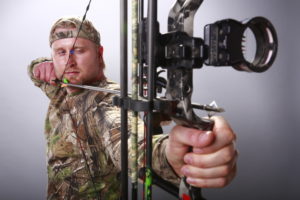
There are tons of components on your bow, but one that often gets overlooked or skipped altogether is the peep sight. But just because people often overlook it doesn’t mean it’s not important. The correct peep sight can extend your range and improve your accuracy, all without you needing to spend a ton of money.
But while the right peep sight can help you out, the wrong one can quickly become more of a detriment than a commodity. That’s why we tracked down and reviewed eight of the best bow peep sights out there.
This way, you can install a peep sight on your bow and hit the range without breaking the bank. If you’re still not sure why you need a peep sight or what to look for in yours, we created a comprehensive buyer’s guide that will walk you through everything that you need to know.

A Quick Comparison of Our Favorites
| Image | Product | Details | ||
|---|---|---|---|---|
| Best Overall |
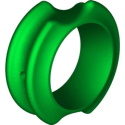 |
G5 Outdoors Meta Pro Peep Hunter Sight |
|
CHECK PRICE |
| Best Value |
 |
Archery Bow Tube Peep Sight |
|
CHECK PRICE |
| Premium Choice |
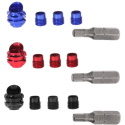 |
IronBuddy Compound Bow Peep Sight |
|
CHECK PRICE |
 |
JY-Sports Archery Aluminum Peep Sight |
|
CHECK PRICE | |
 |
TRUGLO TG76C Centra Peep |
|
CHECK PRICE |
The 8 Best Bow Peep Sights — Reviews 2025
1. G5 Outdoors Meta Pro Peep Hunter Sight — Best Overall
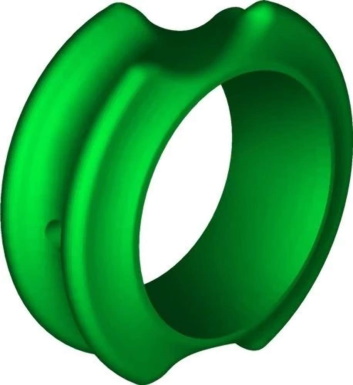
When you’re looking for a top-notch peep sight to put on your bow, the G5 Outdoors Meta Pro Peep Hunter Sight is a high-quality choice. This sight has a non-abrasive coating, has radial string groves, and is machined from aluminum.
Moreover, there are two different sizes to choose from and six different color options, allowing you to customize your peep sight to your bow. While this is a little expensive for a peep sight, it’s still extremely affordable.
- Six color options
- Non-abrasive coating
- Radial string grooves give a tight fit
- Two size options
- Machined from aluminum
- More expensive for a peep sight — still affordable
2. Archery Bow Tube Peep Sight — Best Value
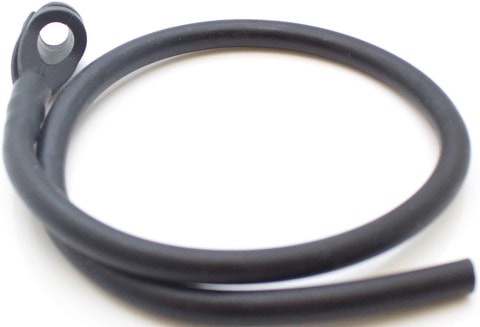
If you’re looking for the best bow peep sight for the money, you want the Archery Bow Tube Peep Sight. It’s an extremely affordable product that delivers long-lasting performance and an easy-to-use design.
However, this peep sight does not use a tubeless design, although it has a long-lasting silicone tube, it’s still not as long-lasting as aluminum. Finally, it has deep grooves that give your peep sight a snug fit, and you get a wide viewing angle for better views. Overall, we think this is the best bow peep sight available on the market.
- Affordable product
- Utilizes a silicone tube for proper positioning
- Grooves are deep for a snug fit
- Wide viewing angle
- Silicone design is not as durable as aluminum
3. IronBuddy Compound Bow Peep Sight — Premium Choice
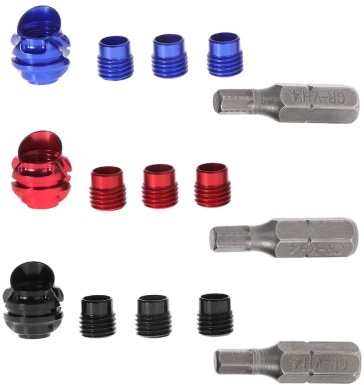
You might not think about your peep sight much, but it can be the difference between making your shot and going home empty-handed. So, why skimp out? This IronBuddy Compound Bow Peep Sight comes with three different size options that you can cycle between and has aluminum construction.
It’s extremely easy to set up and use and comes with everything that you need to change your peep sight sizes. Finally, while higher priced for a peep sight, it’s far from expensive, so why not go for the best of the best?
- Three different size options
- Made from aluminum
- It comes with a hex wrench to change peep sight size
- Easy to use and set up
- More expensive for a peep sight — still affordable
4. JY-Sports Archery Aluminum Peep Sight
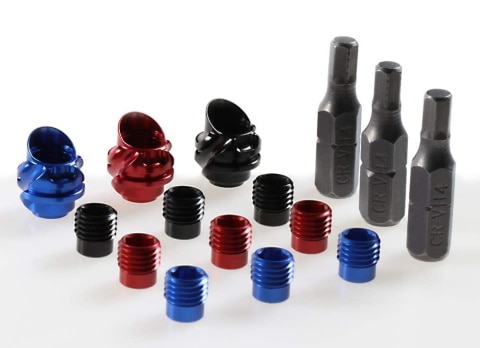
A top-notch choice is the JY-Sports Archery Aluminum Peep Sight. The advantage of the JY-Sports peep sight is the versatility. Not only are there three different color options and three different peep sizes that you can choose from when buying it, but when you’re placing your order, there are also two different angles that you can get: 37 degrees and 45 degrees.
Finally, it comes with a wrench that allows you to swap out the sight sizes, which is an excellent perk when you’re out at the range or getting your gear ready before heading out.
This peep sight is a bit more expensive compared to some other options, but we’re not sure that an expensive peep sight truly exists, so it’s a great choice.
- Two angle options
- Three color options
- Three different size options
- It comes with the wrench for size installation
- Slightly more expensive for a peep sight
5. TRUGLO TG76C Centra Peep

Whether you own a TRUGLO sight or have just heard of the brand, these TRUGLO Centra Peep Sights aren’t bad. They come in three different size options and are available for an affordable price.
If you’re trying to save even more money, they sell these peep sights in bulk packs, which is excellent if you own a shop or will be setting up a ton of bows. However, these are budget peep sights, and as such, they’re not as high-quality as some other options.
- You can buy in bulk
- Three different size options
- Affordably priced
- Not as high quality as other options
6. RAD Super Deuce Peep Sight
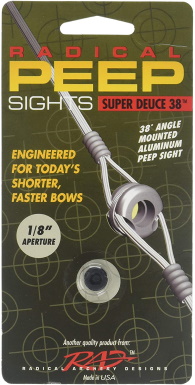
Whether you plan on having someone else install your peep sight or you’re a pro at it, you should consider the RAD Super Deuce Peep Sight. While it can be challenging to install, there are tons of perks once it’s on.
First, you can choose four different size options when ordering, and it uses dual radius slotting for a secure fit. Moreover, it utilizes grooved fittings to keep your peep from shifting from shot to shot, which is a huge perk.
This peep sight uses a 38-degree angle, exactly how many shooters want to align their peep. It’s a great choice through and through — after you get it installed.
- Four different size options
- It uses a 38-degree angle
- Dual radius slotting gives you a secure fit
- Grooved fitting helps prevent peep loss or shifting
- It can be challenging to install
7. Pine Ridge Archery Z-38 Peep Sight
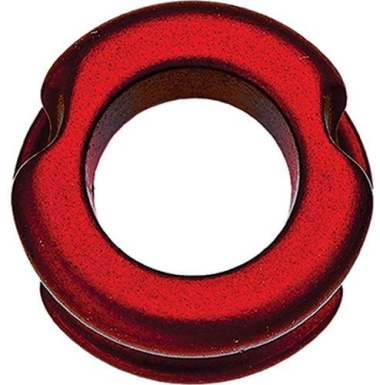
The Pine Ridge Archer Z-38 Peep Sight is a decent choice for your bow, though it’s not that versatile. What we mean is that if you’re looking for a 38-degree aluminum red peep sight, it’s a great choice, but there are no customization options if you want something a little different.
Pine Ridge makes this peep sight in the U.S.A., and it has polished and smooth edges, so you don’t have to worry about it cutting your bowstrings over time. Finally, the string channels are extremely deep, so the peep sight rarely slips out of place.
- It has a 38-degree angle
- It has a deep string channel to prevent slippage
- Made in the U.S.A.
- Made from aluminum
- Polished and smooth edges
- It only comes in one size option
8. Pine Ridge Archery Nitro Peep Sight
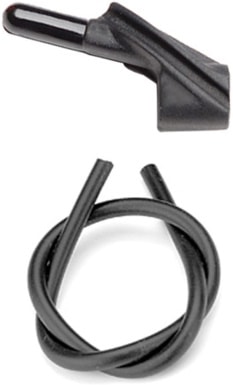
The Pine Ridge Archery Nitro Peep Sight is an affordably priced option that comes in eight different colors. Pine Ridge makes this sight in the U.S.A. While it doesn’t have a tubeless design, it is made of a resin material that is resistant to rot and cracking, so it should last a while.
- Affordably priced
- Eight color options to choose from
- Made in the U.S.A.
- Utilizes a dry-rot-free design
- It does not have a tubeless design

Buyer’s Guide
We know that you’re bound to have a few questions before you purchase a peep sight. Whether you’re new to bow hunting and don’t know what you need a peep sight for or you’re an experienced shooter, we’ll walk you through everything that you need to know before and after you purchase your new peep sight.
What Is a Peep Sight?
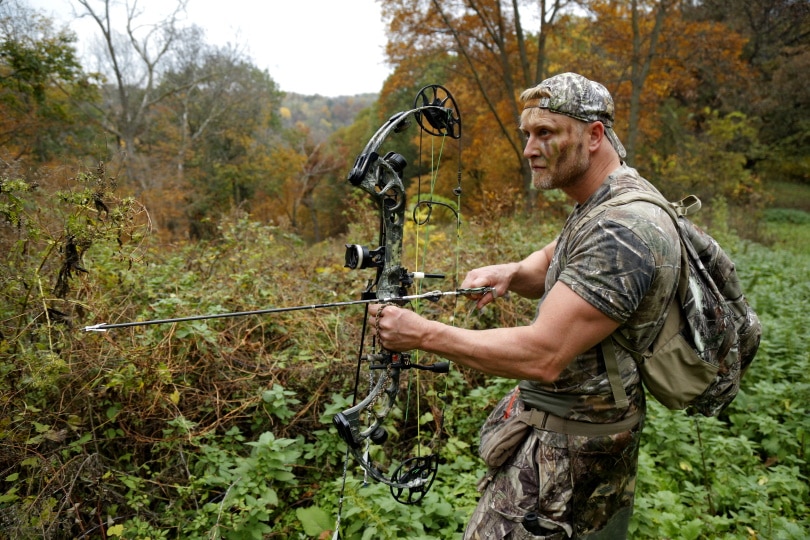
Before we can explain why peep sights are so great and what you need to do after you get one, you need to understand what these circular products are and what they do.
In short, you mount a peep sight on your bowstring, and when you pull back the string, you line up the peep sight with the sight to line up your shot.
It works the same way that an iron sight works on a rifle. When lining up your shot with iron sights, you can line up the front crosshair with a peep sight to take your shot.
Advantages of Peep Sights
There are tons of advantages to peep sights. First, they ensure that you have everything lined up the way that you need to make your shot. Without a peep sight, you can end up missing your shot because your bow isn’t perfectly parallel with your line of sight.
Not only that, but peep sights also help limit the amount of exterior “noise” that you experience when lining up your shot. When you’re looking through the peep sight, it narrows your field of view a bit, and this can make it easier to line up and take your shot.
While you can certainly get by without a peep sight, many shooters prefer them for these reasons and more.
Disadvantages of Peep Sights
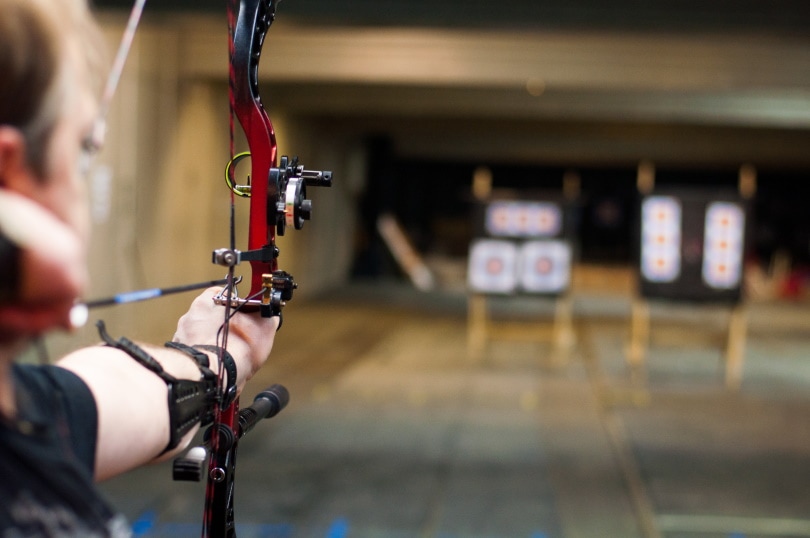
When someone complains about a peep sight, it’s almost always about their field of view and brightness. But even that is a tertiary complaint.
That’s because while peep sights increase your accuracy by limiting your field of view, they also limit the amount of light that comes through, which can make them more challenging to shoot in low-light situations.
However, compared to traditional scopes and sights, peep sights allow more light in because they don’t have any type of filter or lens to obstruct the light.
Things to Look Out For on Your Peep Sight
Whether you’re opting for a tubeless peep sight or a tubed one, there are a few things that you should check out before installing it on your bow. First, check to see that there aren’t any burrs or rough edges on the sight. This is a huge problem for a peep sight because it sits between the bowstrings, and burrs and edges can cut into the string. This means that if you opt for a low-quality peep sight, you can end up destroying your $100 strings because of a $5 sight.
From there, you need to check how deep the ridges are on the sight. If the ridges aren’t deep enough, the sight will end up flying off the strings after you take a shot. While you might be lucky and be able to find it afterward, it’s not uncommon to need to replace it.
Mounting Your Peep Sight
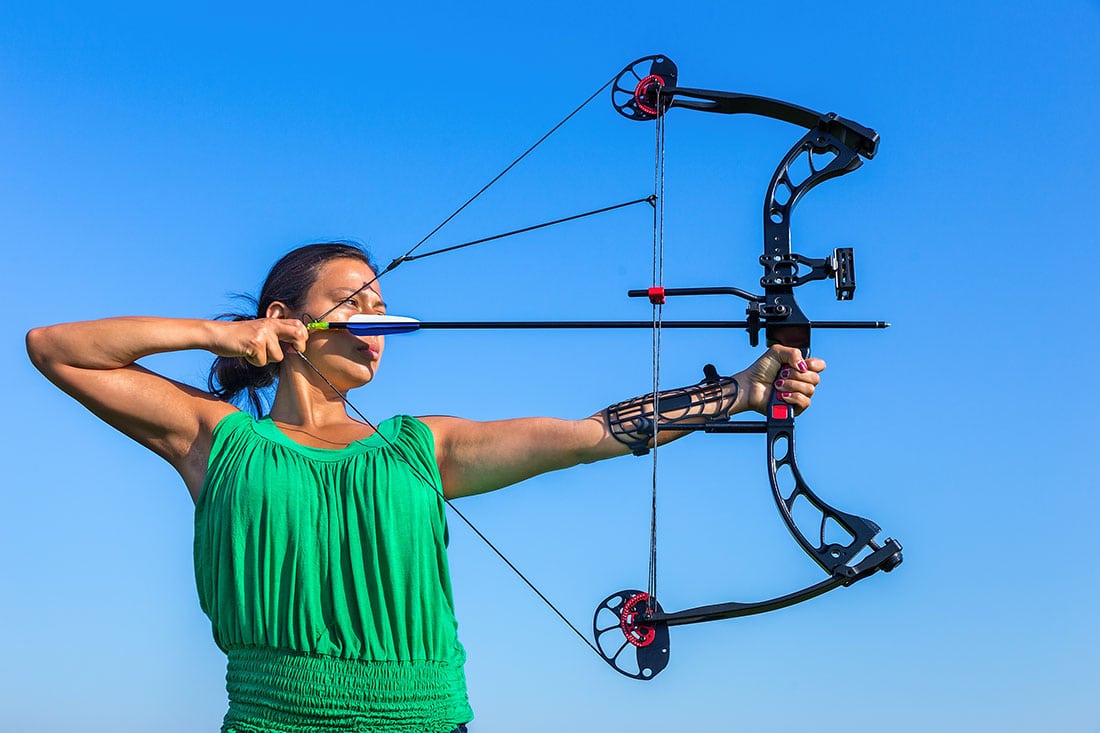
While peep sights can be incredibly beneficial, there’s little doubt that they can be a bit complicated to mount if you don’t know what you’re doing. You start by marking the correct location before releasing the tension, separating strings, installing the peep, and then tying it off.
It’s an easy process to mess up, which is why we recommend having a professional install your first peep sight. After that, replacing the peep sight as needed is easy, so you’ll only have to pay for the professional installation once, and it’s not that expensive.
If you are bent on installing your peep sight yourself, it’s still best to find a helper who’s done it before. It’s a two-person job when marking the location, anyway, so why not get someone with a bit of experience to guide you through the process?
What Angle Do You Want for Your Peep Sight?
When you’re selecting your peep sight, there are two different angles for you to choose from: 37- and 45-degree angles (you’ll find peep sights with slightly different angles, but they’re always close to these measurements).
Deciding which peep sight is right for you has nothing to do with personal preference; instead, it comes down to the brace height and the axle-to-axle length of your bow. Having the right angle is critical to getting a clear view when you’re taking your shot, so check out this chart before making your decision.
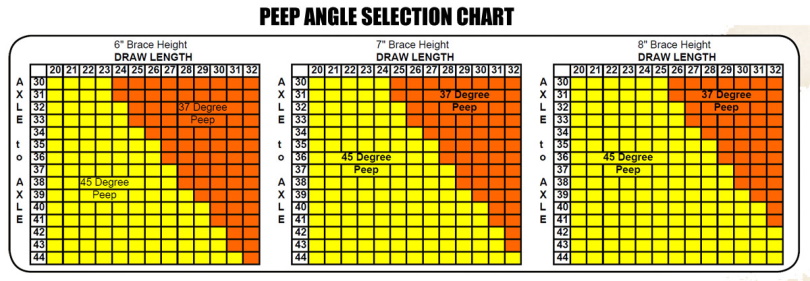
Source: https://simplearchery.com/wp-content/uploads/2018/03/pro-peep-chart_1__1.jpg
Tubeless vs. Tubed Peep Sights
Deciding whether you want a tubed or tubeless peep sight comes down to one factor: how high-quality the strings on your bow are.
If you have high-quality strings, you want a tubeless, or free-floating, peep sight. These are extremely easy to use and don’t come with any of the potential annoyances that tubed peep sights have.
However, if you have a lower quality set of strings on your bow, a tubeless peep sight will spin, which can make them impossible to use. In that case, a tubed peep sight might be a better choice. Tubed peep sights utilize a tube that pulls tight as you draw back, and this holds your peep in place when you’re lining up your shot.
Still, tubed peed sights have two significant disadvantages, and that’s why most users prefer tubeless sights. First, tubed sights are notorious for getting twisted up as you line up your shot, and if this happens, it can mean missing your opportunity as you untangle the line.
Second, tubed peep sights don’t last nearly as long as their free-floating counterparts. That’s because as you pull the tube over and over again, it stretches, and over time, stretching wears out the tube. They can crack and dry rot, both of which will require you to replace your sight.
While silicone tubes last longer than latex, over time, you’ll still need to replace them. On the other hand, tubeless peep sights typically utilize an aluminum construction, and they won’t wear out over time.


Conclusion
After checking out the reviews, you still might find yourself wondering which peep sight is right for your bow. With so many great options out there, it’s no surprise that narrowing it down to a single selection can be a little overwhelming.
If you’re unsure about what peep sight is right for your bow, there’s a reason that the G5 Outdoors Meta Pro Peep Hunter Sight earned the top choice. It’s long-lasting and high-quality, and you don’t have to worry about it sliding out of place when taking your shots.
However, if you’re looking to save a little more money, the Archery Bow Tube Peep Sight is an excellent choice. It doesn’t have a tubeless design, but if you’re fine with that, it’s going to save you a few bucks up front.
Hopefully, this guide walked you through everything that you needed to know and gave you the confidence to order your next peep sight! The next time you head out to the range, you’ll have a top-notch peep sight to improve your accuracy!
Related Reading:
Featured Image Credit: REDAV, Shutterstock
Table of Contents
- A Quick Comparison of Our Favorites
- The 8 Best Bow Peep Sights — Reviews 2025
- 1. G5 Outdoors Meta Pro Peep Hunter Sight — Best Overall
- 2. Archery Bow Tube Peep Sight — Best Value
- 3. IronBuddy Compound Bow Peep Sight — Premium Choice
- 4. JY-Sports Archery Aluminum Peep Sight
- 5. TRUGLO TG76C Centra Peep
- 6. RAD Super Deuce Peep Sight
- 7. Pine Ridge Archery Z-38 Peep Sight
- 8. Pine Ridge Archery Nitro Peep Sight
- Buyer’s Guide
- What Is a Peep Sight?
- Advantages of Peep Sights
- Disadvantages of Peep Sights
- Things to Look Out For on Your Peep Sight
- Mounting Your Peep Sight
- What Angle Do You Want for Your Peep Sight?
- Tubeless vs. Tubed Peep Sights
- Conclusion
About the Author Robert Sparks
Robert’s obsession with all things optical started early in life, when his optician father would bring home prototypes for Robert to play with. Nowadays, Robert is dedicated to helping others find the right optics for their needs. His hobbies include astronomy, astrophysics, and model building. Originally from Newark, NJ, he resides in Santa Fe, New Mexico, where the nighttime skies are filled with glittering stars.
Related Articles:
How to Clean a Refractor Telescope: Step-by-Step Guide
How to Clean a Telescope Eyepiece: Step-by-Step Guide
How to Clean a Rifle Scope: 8 Expert Tips
Monocular vs Telescope: Differences Explained (With Pictures)
What Is a Monocular Used For? 8 Common Functions
How to Clean a Telescope Mirror: 8 Expert Tips
Brightfield vs Phase Contrast Microscopy: The Differences Explained
SkyCamHD Drone Review: Pros, Cons, FAQ, & Verdict



